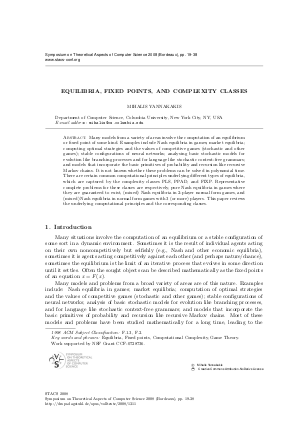Equilibria, Fixed Points, and Complexity Classes
Author Mihalis Yannakakis
-
Part of:
Volume:
25th International Symposium on Theoretical Aspects of Computer Science (STACS 2008)
Part of: Series: Leibniz International Proceedings in Informatics (LIPIcs)
Part of: Conference: Symposium on Theoretical Aspects of Computer Science (STACS) - License:
 Creative Commons Attribution-NoDerivs 3.0 Unported license
Creative Commons Attribution-NoDerivs 3.0 Unported license
- Publication Date: 2008-02-05
File

PDF
LIPIcs.STACS.2008.1311.pdf
- Filesize: 207 kB
- 20 pages
Document Identifiers
Subject Classification
Keywords
- Equilibria
- Fixed points
- Computational Complexity
- Game Theory
Metrics
- Access Statistics
-
Total Accesses (updated on a weekly basis)
0PDF Downloads0Metadata Views
Abstract
Many models from a variety of areas involve the computation of an equilibrium or fixed point of some kind. Examples include Nash equilibria in games; market equilibria; computing optimal strategies and the values of competitive games (stochastic and other games); stable configurations of neural networks; analysing basic stochastic models for evolution like branching processes and for language like stochastic context-free grammars; and models that incorporate the basic primitives of probability and recursion like recursive Markov chains. It is not known whether these problems can be solved in polynomial time. There are certain common computational principles underlying different types of equilibria, which are captured by the complexity classes PLS, PPAD, and FIXP. Representative complete problems for these classes are respectively, pure Nash equilibria in games where they are guaranteed to exist, (mixed) Nash equilibria in 2-player normal form games, and (mixed) Nash equilibria in normal form games with 3 (or more) players. This paper reviews the underlying computational principles and the corresponding classes.
Cite As Get BibTex
Mihalis Yannakakis. Equilibria, Fixed Points, and Complexity Classes. In 25th International Symposium on Theoretical Aspects of Computer Science. Leibniz International Proceedings in Informatics (LIPIcs), Volume 1, pp. 19-38, Schloss Dagstuhl – Leibniz-Zentrum für Informatik (2008)
https://doi.org/10.4230/LIPIcs.STACS.2008.1311
BibTex
@InProceedings{yannakakis:LIPIcs.STACS.2008.1311,
author = {Yannakakis, Mihalis},
title = {{Equilibria, Fixed Points, and Complexity Classes}},
booktitle = {25th International Symposium on Theoretical Aspects of Computer Science},
pages = {19--38},
series = {Leibniz International Proceedings in Informatics (LIPIcs)},
ISBN = {978-3-939897-06-4},
ISSN = {1868-8969},
year = {2008},
volume = {1},
editor = {Albers, Susanne and Weil, Pascal},
publisher = {Schloss Dagstuhl -- Leibniz-Zentrum f{\"u}r Informatik},
address = {Dagstuhl, Germany},
URL = {https://drops.dagstuhl.de/entities/document/10.4230/LIPIcs.STACS.2008.1311},
URN = {urn:nbn:de:0030-drops-13110},
doi = {10.4230/LIPIcs.STACS.2008.1311},
annote = {Keywords: Equilibria, Fixed points, Computational Complexity, Game Theory}
}
